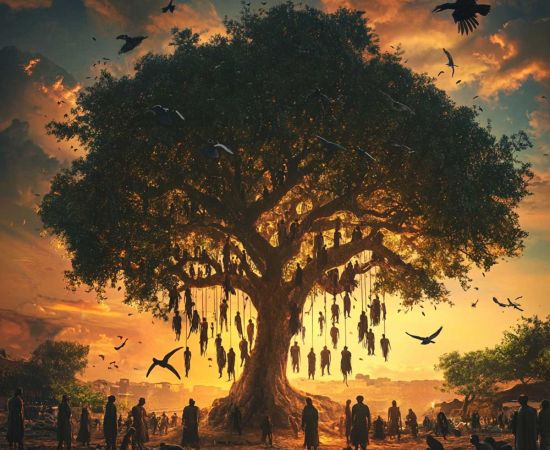MORE COVERAGE
Twitter Coverage
Satyaagrah
Written on
Satyaagrah
Written on
Satyaagrah
Written on
Satyaagrah
Written on
Satyaagrah
Written on
JOIN SATYAAGRAH SOCIAL MEDIA
"आखिर, जौहर क्यूँ होता था": In Pakistan, Salman Waheed was apprehended while digging up a recently-buried woman's grave in Karachi and sexually abusing her corpse, also he shockingly admits to the repeated raping deceased women in the graveyard

In a shocking incident reported on Friday, 9th August, Salman Waheed, a 40-year-old man, was apprehended by Karachi Police for his heinous acts at the Korangi graveyard in Karachi. According to a report by ARY News, which cited police sources, Waheed was caught in the act of desecrating graves and was subsequently arrested. This disturbing behavior, known as necrophilia, involves committing sexual acts with corpses.
|
The police detailed that Waheed had confessed to violating the sanctity of four female graves, subjecting the deceased within to sexual abuse. The grotesque details emerged when locals discovered him desecrating the grave of a recently interred 55-year-old woman. The community members intervened, subdued him, and handed him over to the authorities.
Tahir Abbas, a crime reporter, spoke to a local TV channel where he identified the perpetrator as Salman Waheed, adding another layer to the grim narrative. The arrest, which took place in the Bagh Korangi Cemetery, shed light on a series of disturbing incidents where the accused targeted fresh graves of women, exhuming the bodies to fulfill his macabre desires.
The Korangi police, in a statement, clarified that Waheed was detained under charges of rape, specifically for his actions in the Bagh-i-Korangi graveyard.
Following the harrowing discovery of grave desecration at the Korangi graveyard, the son of the deceased woman whose grave was violated lodged a formal complaint. Based on this, the Awami Colony police initiated legal proceedings against Salman Waheed under several serious charges. The accused faces allegations under sections 297, which addresses trespassing on burial places; 376, covering punishment for rape; and 354, concerning assault or criminal force to a woman with the intent to outrage her modesty, as stipulated in the Pakistan Penal Code.
The complainant, deeply aggrieved, recounted to the police that he had only just buried his mother the previous Thursday evening. Tragically, mere hours later, around 10:30 pm, he was informed of the defilement of his mother's final resting place. Upon arriving at the scene, he found that vigilant locals had already apprehended Waheed after catching him in the act. The offender was reportedly using an emergency light during his ghastly activities, which further facilitated his immediate capture by the community members who handed him over to the local authorities.
During the police interrogation, Waheed chillingly confessed to a pattern of premeditated crimes. He admitted that he routinely monitored the burials of women and would return under the cover of night to unearth their graves and commit his atrocious acts against the deceased.
Adding a layer of historical context to his criminal behavior, it was revealed that this was not Waheed's first arrest for such disturbing activities. Eight years prior, in 2016, he had been caught and detained by locals for similar offenses in another section of the Korangi graveyard, specifically in Korangi No.01.
Police Surgeon Summaiya Syed provided further details regarding the procedural steps taken following the arrest. According to Syed, as reported by Dawn, the accused was transported to the Jinnah Postgraduate Medical Centre for a thorough medical examination. Concurrently, the body of the deceased woman, one of Waheed's victims, was exhumed to undergo a post-mortem examination. This examination was meticulously overseen by police authorities to ensure the integrity of the process. Additionally, DNA samples were collected from the victim’s son to assist in the investigation. Following these examinations, the family of the deceased re-buried her body, seeking to restore some semblance of dignity after the traumatic violation.
This incident in Karachi draws unsettling parallels to another recent and shocking case reported on 22nd June from Lahore. In an equally horrifying event, a three-month-old child's body was reported missing just hours after its burial at Miani Sahib Graveyard. The child’s father, Abdul Rahman, discovered the disappearance the following day when he found the burial shroud discarded outside the grave. Distraught, he immediately contacted the authorities to report the ghastly discovery.
In response to Rahman’s report, the police swiftly acted and arrested three individuals connected to this despicable act, including a security guard who was on duty at the time of the incident. The First Information Report (FIR) noted that this appalling event took place on 23rd April.
These cases, disturbing in their nature, underscore a troubling trend of necrophilia in Pakistan, with multiple incidents surfacing in recent years.
Cases of Necrophilia
Disturbing trends of necrophilia continue to surface in Pakistan with several appalling cases reported over the past years, pointing to a deeply troubling issue within certain areas of the country. One such case occurred in May 2022, where the tranquility of Chak Kamala village in Gujrat was shattered. Here, the corpse of a teenage girl was exhumed and violated. The incident prompted an extensive investigation involving the questioning of 17 suspects, as revealed by the deputy secretary-general of the Pakistan Muslim League (PMLN).
Earlier, in August 2021, another grievous incident was reported from the Thatta district. In this case, individuals dug out the corpse of a 14-year-old girl who had recently died of natural causes and subsequently raped her. This heinous act occurred in Maulvi Ashraf Chandio village near the coastal town of Ghulamullah, highlighting a recurring pattern of grave violations.
December 2020 witnessed a chilling confession from a teenage boy in Lahore. While in police custody, he admitted to committing necrophilia after he had murdered his seven-year-old cousin. The crime took place in a village in the Mohlanwal area, after which he disposed of her body in a pond, adding layers of horror and tragedy to the incident.
Further back, in 2019, the media outlet Satyaagrah reported a similar crime in Karachi’s Landhi Town area, where a group of unidentified men desecrated the grave of a woman and raped her corpse. Each of these cases demonstrates not only the act of necrophilia but also the blatant disrespect and violation of the deceased and their grieving families.
One of the most horrifying cases occurred in 2011, where a man named Mohammad Riaz was arrested and confessed at the North Nazimabad police station. He shockingly admitted to having desecrated the remains of 48 women over the span of eight years in the Paposh Nagar graveyard. This case in particular underscores the serial nature of such crimes and the profound societal and moral issues that they represent.
These cases, spread over a decade, illustrate a stark and horrific pattern of abuse that transcends the sanctity of life and death. A significant legal step was taken as Syeda Izzat Fatima, a lawyer, filed a writ petition in the Lahore High Court. The petition seeks to address this grave issue through the implementation of stringent laws and policies. Fatima's petition highlighted a concerning gap in the legal system; she noted that despite numerous reported—and likely many unreported—incidents of individuals molesting dead bodies across Pakistan, there are currently no specific laws tailored to prosecute such acts effectively.
In her petition, Fatima referenced the disturbing case of Mohammad Riyaz, who was implicated in the molestation of 48 bodies in Karachi’s North Nazimabad Town. This reference was intended to underscore the severity and the recurrent nature of these crimes, which she argues necessitate dedicated legal measures to prevent and punish.
Adding an international dimension to the discourse on necrophilia, the petition coincided with a chilling revelation from an Afghan woman known as Muskan, covered by News18. Having formerly served in the police force in Afghanistan, Muskan fled to India, driven by a fear of the Taliban. She disclosed that members of the Taliban have committed acts of necrophilia, detailing that they have engaged in sexual acts with deceased bodies. According to her, the Taliban's violence towards women is systemic, aiming to subjugate women from every family either through abduction or murder.
These revelations, both from within Pakistan and from neighboring Afghanistan, have stirred significant concern and have highlighted the urgent need for comprehensive legal reforms. The filing of the petition by Syeda Izzat Fatima marks a critical step towards acknowledging and addressing these violations of human rights and dignity, advocating for a legal framework that can bring justice and protection in cases of necrophilia.
 |
 Support Us
Support Us
Satyagraha was born from the heart of our land, with an undying aim to unveil the true essence of Bharat. It seeks to illuminate the hidden tales of our valiant freedom fighters and the rich chronicles that haven't yet sung their complete melody in the mainstream.
While platforms like NDTV and 'The Wire' effortlessly garner funds under the banner of safeguarding democracy, we at Satyagraha walk a different path. Our strength and resonance come from you. In this journey to weave a stronger Bharat, every little contribution amplifies our voice. Let's come together, contribute as you can, and champion the true spirit of our nation.
 |  |  |
| ICICI Bank of Satyaagrah | Razorpay Bank of Satyaagrah | PayPal Bank of Satyaagrah - For International Payments |
If all above doesn't work, then try the LINK below:
Please share the article on other platforms
DISCLAIMER: The author is solely responsible for the views expressed in this article. The author carries the responsibility for citing and/or licensing of images utilized within the text. The website also frequently uses non-commercial images for representational purposes only in line with the article. We are not responsible for the authenticity of such images. If some images have a copyright issue, we request the person/entity to contact us at This email address is being protected from spambots. You need JavaScript enabled to view it. and we will take the necessary actions to resolve the issue.
Related Articles
- "बच्चा बाजी": Bacha bazi remains a brutal tradition in Afghanistan & Pakistan—young boys dressed as dancers, raped by powerful men, and discarded in silence, as poverty, corruption and denial turn this pedophilic nightmare into a protected cultural farce
- Pakistan: In a shocking incident, unknown men dug out the corpse of a teenage girl and raped it in Chak Kamala village in Gujrat: 17 suspects being interrogated
- 16-year-old Hindu girl, Arti Kumari Das went missing on March 5, to be later found dead near railway tracks in Bongaigaon, Sarfaraz Hussain is detained on the suspect of coercion and love jihad, sparking protests and a strong community demand for justice
- "From moon to loan missions, the Pakistani saga": Ex-PM Nawaz Sharif is back, crying that while India is making moon trips, Pakistan's top job seems to be asking the world for spare change, quite the cheeky take on Pakistan's 'moon vs spoon' moment!
- “Waiting. Like it or not, it’s a skill all spies have to master eventually”: Seema Haider Case: Cross-Border Love, how she got bail in 3 days by Magistrate Nazim Akbar and probe intensifies as ATS, IB swing Into action, Pakistani Bhabhi to be arrested?
- Demanding Fast-Track Trial against Mohammed Arif who slit throat of minor girl Prachi Rana, thousands took to Streets In Himachal, protest ‘Love Jihad’ Cases: Visuals show protesters demanding capital punishment
- "Bizarreness masqueraded as liberalism": Pakistan, a Self-proclaimed 'Riyasat-e-Medina' banned the Holi festival in universities across the country to tackle ‘erosion of Islamic identity’ after Hindu students at Quad-i-Azam University in celebrated Holi
- "ये न थी हमारी क़िस्मत": In Bishkek, Kyrgyzstan, violent mobs have targeted Pakistani MBBS students, resulting in serious injuries, many killed & prompting urgent calls for safety; the response from Pakistani authorities widely condemned as insufficient
- ‘Love Jihad’ Rears Its Ugly Head? Tamil Hindu Girl, Abducted And Converted By Muslim Extremists, Among SL Blast Suspects
- "Saying goodbye without words, a heartache that lingers": POCSO Court in Uttar Pradesh delivers justice by awarding the death sentence to a child rapist and murderer Mohammed Faheem in Bulandshahr, sending a strong message against such heinous crimes
- “My grandfather would say, ‘Dear, there is nothing that you can say that will shock me”: Mohammed Amrish, a suspended cop of Tihar Jail with his accomplice Mohammed Raja raped his own granddaughter finding her alone in Delhi's Bhalswa Dairy
- Karachi's 150-year-old Shree Mari Mata Mandir faces demolition, amid allegations and land disputes, Pakistan's Tamil community mourns the loss of their sacred space, while yearning for justice and respect in a land they've called home for generations
- "Marzi Khuda ki bhi chahaiye maut ke liye": Pakistan arrests Lashkar-e-Taiba leader Sajid Mir, the ‘dead’ mastermind of 2008 Mumbai terror attacks who suddenly came back to life, also brain behind Denmark bombing codenamed ‘Micky Mouse'
- Congress-led Chhattisgarh government’s plans to allot government land to Pakistan-based Dawat-e-Islami banged after local BJP leaders opposed any such moves
- Wikipedia dismisses Love Jihad as a conspiracy theory by Hindus, but claims reverse Love Jihad against Muslims is real



























